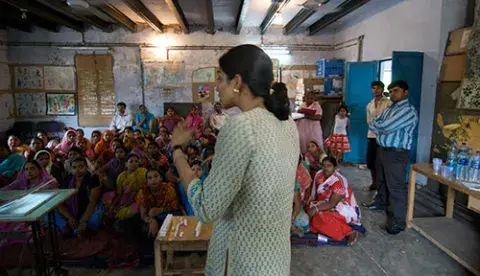
Passionate about cities and with a deep love for New Delhi, Rakhi Mehra, Adjunct Professor for Franklin’s Master of Science in International Management, challenges her Business and Management students to develop entrepreneurial skills in social innovation beyond the classroom.
An Economics graduate from the University of Delhi, Oxford University and Harvard Business School, Professor Mehra’s main inspiration during her education was Professor Muhammad Yunus’ pioneering work with Grameen Bank in micro finance. She co-founded mHS CITY LAB in India in 2009, an interdisciplinary social enterprise that enables residents to self-construct, and consequently, to participate in the development of local neighborhoods that will improve their quality of life, safety and overall inclusion into cities.
As she remarked, “It all began as a field project for my real estate class at HBS. With rapid urbanization, India was facing an acute housing crisis for the poor. The solutions proposed by government and private players were ‘low-cost’ mass housing in periphery of cities for the poor, where land was cheap. This solution was short-sighted, potentially disastrous, leading to social exclusion and ghetto cities.” By working with a classmate from the Harvard Design School, “we proposed a new model based on rentals, submitted the idea for the 2009 business plan contest, and got to the finals! A summer fellowship from the Social Enterprise Club at Harvard got mHS off the ground.”
Despite the initial challenges pertaining to working with local government, coupled with “corruptive practices that were an absolute no-go for a social enterprise”, Professor Mehra was determined to address the urban housing challenge. mHS successfully piloted innovations on homeless shelters and dormitories, and advised the Low Income Housing Finance (LIHF) program of the World Bank, a 100 million U.S. Dollar credit facility with the Government of India that reached out to over 15,000 families.
In line with the United Nations' Sustainable Development Goal 11, "Make Cities and Human Settlements safe, inclusive, sustainable and resilient," mHS believes it is imperative to improve the quality and safety of non-engineered informal housing. As explained by Professor Mehra, “Neev™ is the latest such project to be incubated, a digital platform specifically designed to assist lending institutions, contractors, training programs, post-disaster agencies and other stakeholders to improve construction quality and manage responsible financing in India's informal settlements.”
In this sense, it is by leveraging the power of the Cloud that mHS CITY LAB aims to bridge the knowledge and information gap with a revenue model based on a software as a service offering. "Our ambitious goal is to extend the platform for partners, globally. Neev™ is as relevant in Mexico, Indonesia and Afghanistan, where people face a high risk of disaster and similar housing challenges for low-income populations."
“When I teach my courses and Academic Travel programs at Franklin,” Professor Mehra pointed out, “students are exposed to social innovation ventures, entrepreneurship and the UN 2030 Agenda – I use the projects of mHS as case studies for hands-on and more impactful learning experiences. The students are the future leaders, and our hope is for them to be pro-active, responsible and collaborative decision makers in the complex and interconnected world in which we live today.”

